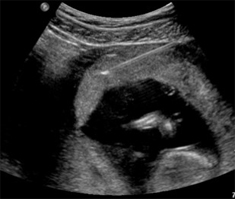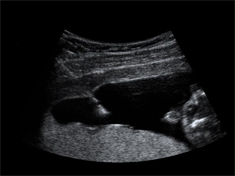Our Services
Invasive Testing
In the event of a high-risk screening result following 1st or 2nd trimester assessment, the only way to confirm that the complement of all chromosomes of the fetus are normal is by performing an invasive procedure – either a Chorionic Villus Sampling (CVS) or an Amniocentesis. The risk of miscarriage with either is 1%.
Chorionic Villus Sampling (CVS)

A CVS is a sampling of the placental tissue (chorionic villi) and is offered between 11 and 14 weeks gestation.
Following informed consent, the mother’s abdomen is cleaned and a local anaesthetic injection is given. A very fine needle is then passed under ultrasound scan guidance through the mother's abdomen, into her womb and directly into the placenta where a sample of chorionic villi is taken. The needle is then removed and the entire procedure, which takes about one minute, is performed under careful ultrasound scan observation. A scan is performed afterwards to assess the fetal heart rate and confirm fetal wellbeing.
Amniocentesis

This is a sampling of the amniotic fluid and is offered after 16 weeks gestation.
Following informed consent, a very fine needle is passed under ultrasound scan guidance through the mother's abdomen, into her womb and into the amniotic fluid where a sample is aspirated. The needle is then carefully removed and the entire procedure, which takes about one minute, is performed under careful ultrasound scan observation. A scan is performed afterwards to assess the fetal heart rate and confirm fetal wellbeing
Patients may experience a short-lived period-like pain straight after the procedure which subsides soon afterwards with or without simple pain-relief such as Paracetamol. It is advisable to seek medical assistance should the pain worsen, or if bleeding or fever is encountered.
Results are available within three working days for Trisomies 21, 18 and 13 (Down’s, Edward’s and Patau’s Syndromes), and up to two weeks for a full chromosomal analysis (karyotype). We will notify patients telephonically as soon as these are available. In around 1% of cases, the results may be inconclusive and repeat testing would be offered.
